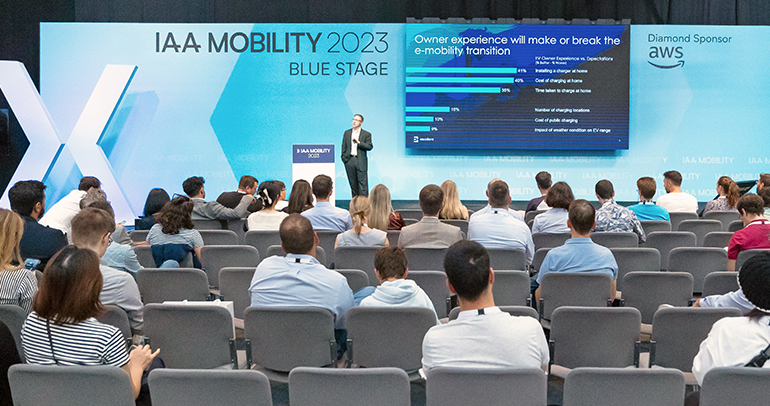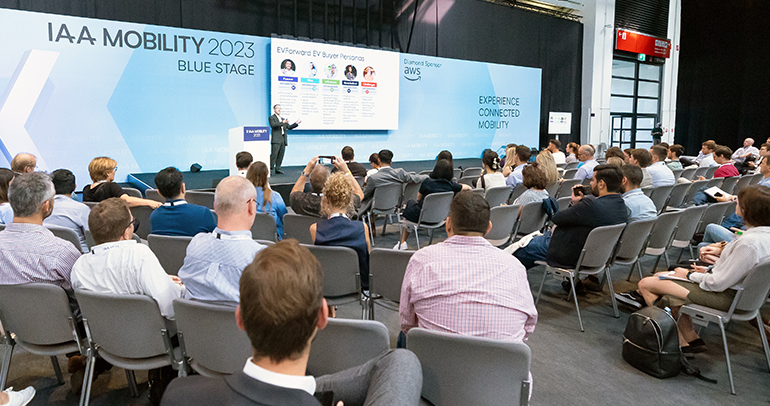
We recently had the opportunity to attend and speak at the biennial IAA Mobility show and conference in Munich. As Europe’s premier automotive and mobility event, IAA Mobility telegraphs the future of the automotive industry. We identified three themes from this year’s show that will impact automakers, tech companies and consumers over the coming years.
1. The Growing Importance of the Automotive Ecosystem, But What About the Consumer?
“Ecosystem” was the watchword of the conference, an acknowledgment that cars must serve a broader context than just mobility. Battery electric vehicles (BEVs), for example, need to support the electric grid and the increasing amount of variable renewable generation on the grid. Connected vehicles need to fit within consumers’ existing technology ecosystems.
Many speakers indicated that this increasing focus on an automotive ecosystem would put consumers at the center of what ecosystem partners do. For instance, Mate Rimac, CEO of Rimac Automobili, spoke of an “ecosystem, thinking about users, not owners.” Similarly, Richard Bouveret, CEO of Blue Solutions, discussed how battery electric vehicles need to exist within a broader energy ecosystem.
However, despite promises of consumer-centricity, speakers couldn’t define precisely what being consumer-centric meant within the context of the automotive ecosystem. Only one panel on how data inform a “next-level user experience” in purchasing a car acknowledged that their organizations struggled to get direct consumer feedback. This is ironic because it is only by obtaining direct consumer feedback that organizations can aspire to develop better products, services and user experiences.
For whatever broader ecosystem vehicles must serve moving forward, consumers must be at the center of it and involved so industry players can take into account their opinions, desires and emotions when designing or enhancing products and services. Consumer voices help companies identify unmet needs, refine feature sets and craft winning go-to-market strategies. Whether with quantitative or qualitative research, hearing from consumers is what sets great companies—and stellar products and services—apart from merely good ones.
If your organization needs help going from the theory of consumer-centricity to how to put it into practice, Escalent can help. We have decades of experience helping our automotive and mobility, energy and technology clients understand consumer needs and translate them into winning products.
For instance, our EVForward™ study of the next generation of BEV buyers explores how to create a compelling consumer value proposition for grid-interactive electric vehicles to overcome significant consumer concerns about the impact of vehicle-to-grid on expensive vehicle batteries.
2. Software Eats the Auto World
Technology companies such as Qualcomm, Google, Meta, Amazon and TikTok had starring roles at the conference, occupying prime main stage time slots. Befitting the ecosystem theme, these companies emphasized cross-industry collaboration while simultaneously demonstrating a desire to have a much more significant influence on the automotive industry than has historically been the case. In return, automotive brands seemed more ready than they have ever been to enlist support from technology companies as automakers have realized that their in-house expertise is not sufficient to address consumers’ mushrooming tech needs and sophistication.
Tech companies presented automotive and mobility solutions that spanned from “back of house” to “front of house.” Meta pitched the metaverse as an environment for virtual vehicle development, while Amazon talked about how Amazon Web Services could facilitate virtual testing, accelerating development cycles that previously required real-world experience.
Automotive supplier Continental discussed the future of the software-defined vehicle (SDV), which essentially amounts to an architectural change to centralized vehicle computing rather than distributed control modules across vehicle systems. This was clarifying because while SDV has the potential to create value for end consumers, it doesn’t inherently do so. Automakers and suppliers that don’t use the transition to SDV to differentiate themselves to consumers will miss an opportunity to carve out a competitive advantage.
Conversely, Google and Qualcomm shared their vision of how connected vehicle solutions will impact consumers. Google’s offerings (Android Auto, Android Automotive OS and Google Automotive Services) accelerate vehicle software development cycle timelines while providing consumers access to services and apps such as Google Maps that they use in non-automotive contexts. Qualcomm discussed how its Snapdragon Digital Chassis can enable in-vehicle connected services such as a “digital concierge” that could suggest context-relevant information and handle tasks such as ordering groceries.
For automakers looking to generate new revenue from connected vehicle services, a partnership with one or more tech companies may make good sense from a development standpoint. We’ve also found that consumers welcome these partnerships, with a recent EVForward™ study showing how auto-tech partnerships can accelerate BEV adoption.
3. The Chinese Are Coming, and What It Means for BEV Adoption
Many traditional automotive brands were conspicuous by their absence at IAA Mobility, including Ford, Audi and the Stellantis brands (except for a token effort by Opel). Of the automakers that were present, Chinese brands occupied at least twice the floor space as the other brands combined.
The Chinese presence was led by BYD, which introduced its Seal compact luxury BEV, a direct competitor to the Tesla Model 3. Other Chinese brands represented included Seres Group, Dongfeng, Leapmotor, XEV and MG Motor (a British brand owned by Chinese conglomerate SAIC). Geely-owned brands Zeekr and Polestar also had cameos at supplier booths. Across these brands, every vehicle shown was a BEV and pricing was highly competitive, not just with American and European BEVs but also with traditional internal combustion engine vehicles.
During my presentation at IAA Mobility, I shared data from the latest EVForward Europe study that show how BEV sales in the EU and UK are stalling due, in part, to the transition between “early adopter” customers who were willing to pay more for a BEV and “early mainstream” consumers who aren’t.

This is concerning for automakers that are relying on volume sales to mainstream consumers to provide a return on their significant investment in electrified powertrains. The result of this market shift and the lower price point that Chinese automakers are coming to market with is that Chinese brands are poised to gain significant market share in Europe, thereby helping Europe meet its policy goals around e-mobility. After Europe, the Chinese will come to the US with the tried and tested strategies that work best. If US automakers aren’t keeping an eye on China, they should be.
If you would like to learn more about the latest findings from our EVForward Europe study, please click the button below to watch K.C.’s 15-minute presentation at IAA Mobility.










